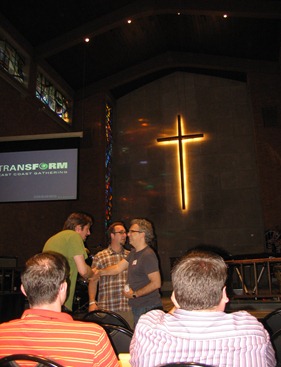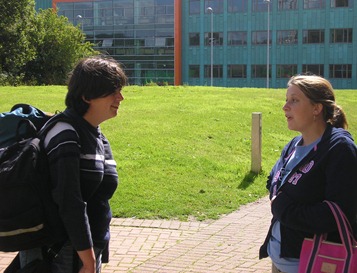This essay will be the simplest of all that follow. It may also be the most important. In considering what a truly missional Quaker movement might look like, it is essential that we clarify what is at the center of our life together. As the title of this essay suggests, I believe that the heart and soul of any faithful missional community must be a shared commitment to following Jesus.
It is easy for us to serve many things besides Jesus. Even as communities whose primary purpose is to follow him, we have the tendency to elevate secondary elements above the Lord himself. From the color of the carpets in the building where we meet, to our styles of worship and the names of our committees, we are very good at latching onto things that should be secondary.
As we develop missional Quaker communities, however, we must not fall into these traps. If Jesus is not at the center of our life together, we have turned our undivided attention – our worship – away from God. No matter how noble or important we may convince ourselves that any other priority is, if it takes the place of following Jesus, we are in great spiritual danger as a community. Across the Religious Society of Friends in North America, our local churches and wider fellowships have spent decades arguing about interpretations of the atonement, the nature of Christ’s divinity, and homosexuality. Yearly Meetings have dissipated untold energy fighting over matters that, while important, can ultimately be distractions from the hard work of taking up our cross and following Jesus.(1)
together, we have turned our undivided attention – our worship – away from God. No matter how noble or important we may convince ourselves that any other priority is, if it takes the place of following Jesus, we are in great spiritual danger as a community. Across the Religious Society of Friends in North America, our local churches and wider fellowships have spent decades arguing about interpretations of the atonement, the nature of Christ’s divinity, and homosexuality. Yearly Meetings have dissipated untold energy fighting over matters that, while important, can ultimately be distractions from the hard work of taking up our cross and following Jesus.(1)
How do we keep our eyes on Jesus? How do we make sure that we are following him and not our own false certainties? There are no easy answers. It is hard not to get caught up in ideology, because ideas really do matter. I would not be writing these essays if I thought otherwise. But there is always the temptation to prioritize ideas over relationship, and when we are primarily focused on being right, our relationship with God is the first thing to go out the window. We stop paying attention. We stop listening.
Probably the biggest single factor that plays into whether we cling to God or to idols of our own making is the depth of our prayer life. If we are to keep our focus where it belongs, it is crucial that we take seriously the importance of prayer, both individually and in community.
We pray when we remember God throughout the day, whispering inwardly, “I love you.” We pray when we wait in stillness, allowing God to speak to our soul and show us our inward condition. We pray when we speak aloud words meant to draw us and others closer to God, acknowledging God’s presence and power. There are so many ways to pray, and all forms of prayer are beneficial, so long as they are prayed in the name of Christ.
God to speak to our soul and show us our inward condition. We pray when we speak aloud words meant to draw us and others closer to God, acknowledging God’s presence and power. There are so many ways to pray, and all forms of prayer are beneficial, so long as they are prayed in the name of Christ.
Of course, merely outwardly concluding our prayers with a perfunctory, “in Jesus’ name” does not assure that our prayers will be rightly directed. We must be in him, and he in us, if we are to pray in the right spirit. Our prayers must be offered in unguarded love, humility and honesty. We must pray as we are, rather than as we wish we were. By making ourselves vulnerable to Christ, he will shine his Light in our hearts and transform us bit by bit, remaking us in his image.
When this happens, all of our self-assuredness melts away, and we find not only intimacy with God, but with our brothers and sisters as well. Our commitment to putting Jesus first has the power to transform community, because when we open our hearts to him, we begin to see how he is at work in others, too. Suddenly, we are able to see others in the Light of Christ. Now, even if we still have profound disagreements, we can see how Jesus is present in the hearts of our brothers and sisters, and we can commit to partnering with Christ’s work in them.
as well. Our commitment to putting Jesus first has the power to transform community, because when we open our hearts to him, we begin to see how he is at work in others, too. Suddenly, we are able to see others in the Light of Christ. Now, even if we still have profound disagreements, we can see how Jesus is present in the hearts of our brothers and sisters, and we can commit to partnering with Christ’s work in them.
Submission to Christ is transformative, even when others in the community are not yet hearing his voice clearly. If our lives are filled with his Spirit, we will answer the the inward Witness in their hearts. Truth recognizes truth. When we demonstrate Christ’s love and forgiveness in our own lives, we can help to ground the community in the Spirit and reframe our life together. His peace can shine through us.
But we will not find this inward peace and centeredness in Christ without any effort on our part. While God’s Spirit is a gift that we cannot earn or achieve ourselves, we will not receive it without a change in our habits and mindset. If we are to be united and effective as a missional community, we must set aside time in our daily lives to ground ourselves in prayer. Only by spending time with Jesus can we become like him.
The mission of the Church is that we all be re-clothed in the peace and righteousness of Christ. In our prayer, both as individuals and as a community, we are drawn deeper into his perfect life; he woos us, consoles us, challenges us and heals us. It is by this ongoing, repeated action of entering into the divine presence that we may keep our eyes fixed on Jesus, not being distracted by the self-deception that constantly threatens to draw us away from God.
as a community, we are drawn deeper into his perfect life; he woos us, consoles us, challenges us and heals us. It is by this ongoing, repeated action of entering into the divine presence that we may keep our eyes fixed on Jesus, not being distracted by the self-deception that constantly threatens to draw us away from God.
We put Jesus at the center of our life as a community when all of our decisions are held in his Light. We truly accept him as Lord of our lives when we seek to do not what we desire, but instead what he is calling us to. The most important question that we can ask on an ongoing basis is: what is Christ calling us to do and be now?
–
1. Please don’t misunderstand me; I think that these issues are deeply important. But following Jesus must precede any solution to the difficulties that they present.
Resources for further study:
Thomas Kelly, A Testament of Devotion, Harper Collins Publishers, 1992.